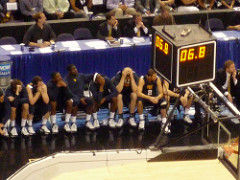"They don't pay nobody to be humble."
NFL great Deion Sanders once uttered these words, though there is arguably more to the man than this.

What Sanders said notwithstanding, sports can be a school for the virtue of humility. However, given the culture surrounding many sports today, from the elite level all the way down to youth sports, it appears many aren't taking advantage of this. That's too bad. It is also something we can change.
Is it really possible for sports to help us grow in this virtue? First, part of what humility involves is an awareness of and acceptance of our limits. Second, and closely related to this, humility involves an acknowledged dependence on others. Athletes depend on coaches, officials, family and friends, and many others for their success, for example.
One thing that makes for a truly successful teammate is a knowledge of where her limits lie. Humility includes just this sort of knowledge. If I am a 60% foul shooter, I shouldn't be asking for the ball in the last 10 seconds of a game when my team is up by 3 points. Instead, I should support it going to my teammate who shoots 90% from the foul line.
Coaches need to know and allow for their limitations as well. Sometimes pride or the felt need to look like you have it all under control can prevent coaches from finding excellent assistants who will challenge them, or allowing their assistants to do so. A humble coach will also wisely ask for input from his players about training, tactics, and other team issues. The humble coach will realize his need for others to give input, to challenge him, to bring their own unique experiences and expertise to bear on the team in order to help it succeed.
Closer to home for most of us, sports parents could use a dose of humility. For example, as a coach, parent, and referee, I've listened to many "sideline experts" on the soccer field who truly don't understand the basic rules of the sport.
Here's a simple way that humility is relevant for a parent in the stands in a soccer match. When you are 40 yards away from the offside line, and the AR calls offside, it is very unlikely that you are right and he is wrong. If he's doing his job, he's standing even with the second to last defender, and watching the position of the attacking players when the ball is played to them. The eyes of parents tend to follow the ball, so the player looks offside when the parents look down the field, but the player was onside at the moment the ball was passed. And the viewing angle of parents is much worse, even if they were watching the attacker the moment the ball was played. Given this, it is humble and wise to avoid challenging such calls, for this and many other reasons.
How can sports be a school for the virtue of humility?
- They can help us understand and appreciate our limits.
- They give us a structure in which humility is an important trait, as we accept instruction, correction, and submit ourselves to the written and unwritten rules of the game.
- They give us chances to praise and encourage others, rather than seeking glory for ourselves.
- When we win, we can do so humbly by acknowledging how others made it possible, and by refusing to let victory puff up our egos.
- When we lose, we can do so humbly and graciously, realizing defeat is a part of life.
There is no guarantee that we will develop humility or any other virtue in sport. But if we are intentional in these and other ways, it is more likely that we'll grow in character. Doing so takes effort and intent, just like becoming a more skilled athlete and coach. In this and other ways, moral and athletic development are very alike.
There is much more to be said here. See below, if you're interested in reading more on this topic.
Reference:
Michael W. Austin, "Is Humility a Virtue in the Context of Sport?" Journal of Applied Philosophy 31 (2014): 203-214.


